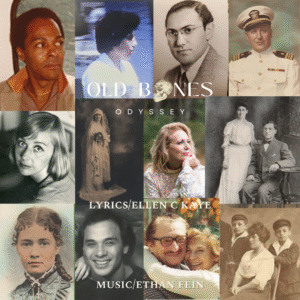
"hymn of the nations"
jan peerce with
arturo toscanini
an american story
parts III & IV
Fighting fascism one generation at a time
“We’re sharing the story of my uncle Jan Peerce, born on the Lower Eastside,
a renowned tenor in The Metropolitan Opera, joining forces with Arturo Toscanini, the world famous conductor.
Together they fought fascism from the homefront during World War II.
“Hymn Of The Nations” was filmed in the NBC Studios, Studio 8H,
between 49th and 50th Streets on Sixth Avenue, in Rockefeller Plaza, New York City in 1943.”


“In December 1943 Arturo Toscanini, who was himself a refugee from fascism, created the film Hymn of the Nations. It was released in 1944 to aid the allies in World War II and made a part of a documentary film released by the Office of War Information to describe how Italian-Americans aided the allies during the war. It was based on the 1862 composition by Giuseppe Verdi called Inno delle nazioni, a patriotic work containing the national anthems of various European nations. Originally composed for a tenor soloist, chorus and orchestra, Toscanini added the Star-Spangled Banner and The Internationale, the national anthem of the Soviet Union, to the arrangement to honor the four main allies in WWII. Toscanini directed the musical performance and enlisted Ellen’s uncle, Jan Peerce, to sing the solos with the accompaniment of The Westminster Choir and the NBC Symphony Orchestra. The film was nominated for an Academy Award for Best Documentary Short in 1945. During the Red Scare (1947-1957), which also included the shameful blacklisting of many actors, directors, producers and artists, a portion of the film was censored by deleting The Internationale, the national anthem of the Soviet Union.
Though my team and I are not historians, we have tried our best to remain true and accurate throughout this post.”- Ellen Kaye



“Peerce became one of the best-loved radio singers of both popular and cantorial music. Toscanini heard him singing Wagner in a broadcast and through a mutual friend invited him to audition. As a result Toscanini felt that he had found the ideal tenor for his broadcasts with the NBC Symphony Orchestra. Peerce first sang with Toscanini in 1938 as the tenor soloist in Beethoven’s Symphony No. 9 and went on to become known as the maestro’s ‘favourite tenor’. He broadcast (and so recorded) extensively with Toscanini, notably in several complete opera performances. Also in 1938 he made his operatic stage debut with the Philadelphia La Scala Opera Company as the Duke / Rigoletto followed by Alfredo / La Traviata and Pinkerton / Madama Buttterfly in 1941.” -Cantorial Legends



the backstory
The backstory to my Uncle Jan’s booking for Hymn of Nations, as told in his biography
The Bluebird of Happiness
The Memoirs of Jan Peerce by Alan Levy, Harper & Row, 1976.
Alice Peerce, Uncle Jan’s wife and Ellen’s Aunt, was also Uncle Jan’s manager. When NBC was looking for a tenor to sing Hymn of Nations, NBC’s General Music Director, Samuel Chotzinoff, invited Uncle Jan to sing. Aunt Alice immediately accepted the invitation without first consulting Uncle Jan or the impresario, Sol Hurok, who was responsible for most of Uncle Jan’s bookings at the time. It turns out that Uncle Jan was double booked that day, having been previously booked by Hurok to perform at the 92nd Street YMHA. When Uncle Jan heard about the booking to sing on NBC at the RCA studios at Radio City he was upset and wanted to back out, thinking he would be performing a Beethoven symphony. When he heard they were asking him to perform Verdi’s Hymn of Nations, he became interested but still had the problem of being double booked that day. Aunt Alice, always the clever businesswoman, insisted he could do both performances. The day Uncle Jan sang Hymn of Nations at RCA studios was, coincidentally, the day Mussolini was overthrown as dictator of Italy. After the concert, Uncle Jan and Aunt Alice took a taxi to the 92nd Street Y and had trouble getting in to do the performance since the Y was mobbed by people who had heard Uncle Jan sing Hymn of Nations on the radio and were now anxious to hear him perform in person. Uncle Jan credits his performance of Hymn of Nations on the radio as making him a household name in America and created demand to book him for concerts from then on.
jan peerce performs
Playlist

3:18

3:39

2:14

3:40

5:05

2:56


an excerpt from "bluebirds of happiness: memoirs of jan peerce"
by alan levy
One day in 1943, I was mad at everybody – including Alice, Toscanini, and Hurok. Alice was still managing some of my career and so, when Samuel Chotzinoff called up to invite me to sing with Toscanini on a national radio hookup at 5 P.M. on a particular day, she said yes without consulting me or the Hurok office. As it turned out, Hurok had booked me that night for a formal concert at the New York Young Men’s and Young Women’s Hebrew Association, Ninety-second Street and Lexington Avenue.
Everybody, including myself, was hysterical. I raged at Alice. I denounced the maestro to Chotzinoff. “I’ve sung four Ninth Symphonies!” I told him. “That’s enough!”
“Who told you it was Beethoven?” Chotzinoff said, looking perplexed.
“Well I presumed–”
“You presumed wrong,” he told me. “You’ll be doing Verdi’s Hymn of the Nations.”
Now, that was much more interesting and exciting! But Mae Frohman at the Hurok office wouldn’t let us out of the booking at the Y. Alice, however, had a solution: “Jan can do both concerts.” Even I was dubious about that, but Alice insisted: “I want you to know that Jan could shake both those programs out of his left sleeve, and that isn’t even his good sleeve. And it’s important to me that we honor our obligation to Toscanini.”
“All right,” said Mae Frohman. “But remember, Alice, if anything happens, it’s your responsibility.”
What happened was one of the high spots of my life. Here was Toscanini – the son of a soldier of Garibaldi; a musician who had escaped into exile rather than let his baton become the tool of a tyrant – playing a piece that Verdi had written for a Garibaldi Day celebration honoring Italy’s struggle to free itself from foreign domination. Toscanini actually changed the wording of the hymn from “Italy, my beautiful country” to “my betrayed country”: “mia patria tradita.” And he made sure that when “tradita” came along, I said it and meant it.
The date of the concert happened to be the day Mussolini fell as dictator of Italy. The announcement was made over NBC during the first half of the performance and Toscanini led a concert that was absolutely earth-shaking. Thanks to the broadcast and the film that was made of it and shown in fifty countries around the world, Hymn of the Nations became a universal ode to liberation – particularly the way Toscanini had my difficult tenor part end up with the Star-Spangled Banner and the Marseillaise and God Save the Queen, sung with the two hundred voices of the Westminster College choir. Years later, at Toscanini‘s funeral service at La Scala in Milan, that’s the recording they played. The day after Mussolini fell, La Scala had been plastered with posters saying: “Return, Toscanini!”
The impact in New York was even more immediate than that. By the time we had driven by taxi from the RCA Studios at Radio City to the Ninety-second Street Y, I had trouble getting into my own concert. The place was mobbed by radio listeners storming the box office for tickets. I sang the concert without any hesitation or strain, and when it was over, Hurok was there to take the credit.
“Look what we did! “ he said. “And I was the only one who knew we could.“ From that moment on, selling me for concerts was a cinch for Hurok because everybody in North America knew me.
coming soon:
new blog post
the mazzini society

When we started reading about how Arturo Toscanini created the film “Hymn Of The Nations” we discovered the people in the Mazzini Society, which he was a member of, and the Rosselli brothers, all proud Italians both in America and in Europe, fighting fascist regimes in the 1930’s through World War II.
watch our latest an american story videos below!
Playlist

3:18

5:50
Sources And Inspirations
ARTICLES
- JAN PEERCE IS REMEMBERED BY HIS COLLEAGUES – The New York Times
How an American Jewish Opera Star Accidentally Launched the Soviet Jewish Movement
Post for Mrs. Jan Peerce – The New York Times
- Mrs. Jan Peerce of New Rochelle, N. Y., wife of the Metropolitan Opera tenor, has been elected co‐chairman of the women’s committee of the Eleanor Roosevelt Memorial Foundation. Mrs. Peerce and other foundation members are planning the organization’s first anniversary luncheon in honor of Mrs. Lyndon B. Johnson. It will take place in the Grand Ballroom of the New York Hilton on April 9 and will further projects in which Mrs. Roosevelt was interested.
Furs and Jewels Stolen From From Home of Jan Peerce – The New York Times
JAN PEERCE IN MOSCOW; ‘Met’ Tenor Opens Tour to Tumuituous Applause – The New York Times
AMERICAN TENOR SINGS IN RUSSIA; Camaraderie Not Provincial – The New York Times
Peerce Sings at Carnegie Hall In Sole Recital of the Season – The New York Times
Peerce Flies Back to U.S. to After Street Fall in Lisbon – The New York Times
Jon Peerce, Back From Tour of Soviet, Suggests More Exchanges of Artists – The New York Times
SINGERS WILL AID FUND; Munsel, Peerce, Warren Return Checks to Johnson Today – The New York Times
Concert Tonight Honors A Cantor for 65 Years – The New York Times
Seven American Musical Artists Listed for Soviet Performances – The New York Times
John Brownlee’s Funeral Attended by Met Singers – The New York Times
FESTIVAL TOMORROW; Hanukkah Program at Garden to Aid Israel Bond Sale – The New York Times
NOTES ON PEOPLE; Roberta Peters to Share Carnegie Celebration – The New York Times
- HUROK SERVICE SET FOR CARNEGIE HALL – The New York Times
America-Israel Foundation Offers “Music Under The Stars” – The New York Times
Notes on People – The New York Times
Jan Peerce, the 70‐year‐old tenor, underwent surgery yesterday on a broken leg he suffered when he fell during a performance at the Westbury (L. I.) Music Fair Wednesday night. Mr. Peerce is said to have lost his footing as he made an exit from the theater‐in‐the‐round stage into the audience. He broke his left leg, which he had broken last October in a fall at his daughter’s home in California,
The Metropolitan Opera singer was appearing in a new musical, “Laugh a Little, Cry a Little,” on a pre‐Broadway tour. After the accident Wednesday, his lines were read by another cast member, Jerry Jarrett. Mr. Peerce was taken immediately to Syosset (L. I.) Hospital and yesterday morning he was transferred to Mount Sinai Hospital here. He hopes to return to the show within a few weeks.
YOUTUBE VIDEOS

listen to the old bones odyssey original songs below
The songs Old Bones Odyssey and These Walls Are Alive are the main themes of our entire project. They are inspired by the people that fill our stories.






